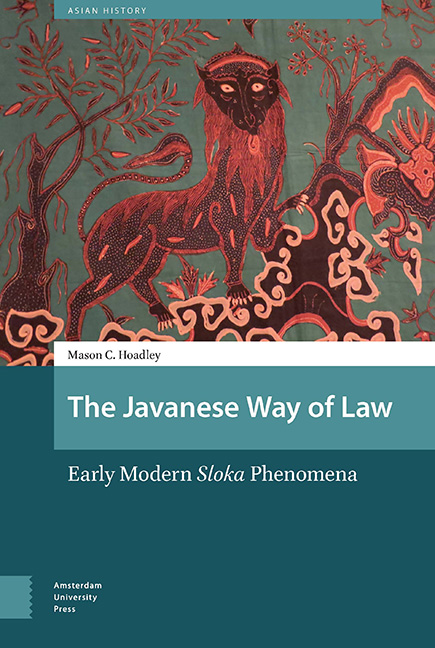Appendix I - The Problematic Pepakem Tjerbon
Published online by Cambridge University Press: 20 November 2020
Summary
The Pepakem Tjerbon publication
In keeping with earlier publications of ostensibly local law, the Semarang and Freijer compendiums in respectively 1750 and 1760, the Pepakem Tjerbon of 1768 was intended for East India Company officials. Had it been directed to the other members sitting on the Javo-Dutch courts – jaksa, pangulu, tumenggung, and Cirebon princes or Priangan Regents – a Javanese text on the model of the Layang Ubaya, Surat Cirebon, or Undang-Undang Nitih Cirebon would have been more appropriate. The Company needed an accessible, consistent, and concrete law text in order that its officials could claim consistency with local custom in reviewing judgments and subsequently accepting, modifying, or invalidating them. Company policy dictated that the legal decisions, vetted in order to keep them within the bounds of Dutch priorities, follow Javanese law ‘in so far as it is compatible to us [the officials of the Company]’, so often stated in the Company records. The ambition with the pepakem project was to be attained through a selection of paragraphs from existing, heterogeneous titles, a pepakem of pepakem, which would embody Javanese written law. In this regard the comprehensiveness of titles chosen by ‘team Hasselaer’ is indisputable. Any listing of relevant Javanese legal traditions matches that cited by the pepakem's introductory rubric.
The Pepakem Tjerbon should have provided the ideal source for reconstructing traditional Javanese written law. However, despite drawing upon most important of the era's legal titles, several factors argue against accepting its contents as representative of the era's law. The most striking failing is suggested by the contrast between the pepakem's contents and that of the Wadigun Wangkara which opened this work. The latter, as all relevant legal titles, is dominated by sloka and sloka derivatives. Yet these key components are conspicuously absence in the Dutch compendium. A partial exception consists of the unique formulation of sinalokan. Two other factors counsel caution in accepting the published Pepakem Tjerbon at face value. The first concerns the supplement to the original Dutch text of an apparently younger Javanese manuscript unencumbered by information on origins or date requisitioned in connection with preparations for the pepakem's publication in 1905. The second is the lack of congruence between the contents of the pepakem's paragraphs and those of the titles from pre-existing Javanese manuscripts cited as its source.
- Type
- Chapter
- Information
- Javanese Way of LawEarly Modern Sloka Phenomena, pp. 203 - 214Publisher: Amsterdam University PressPrint publication year: 2019

